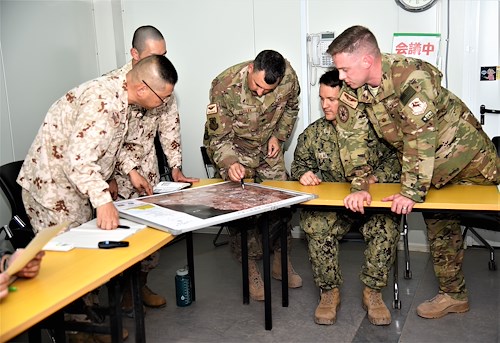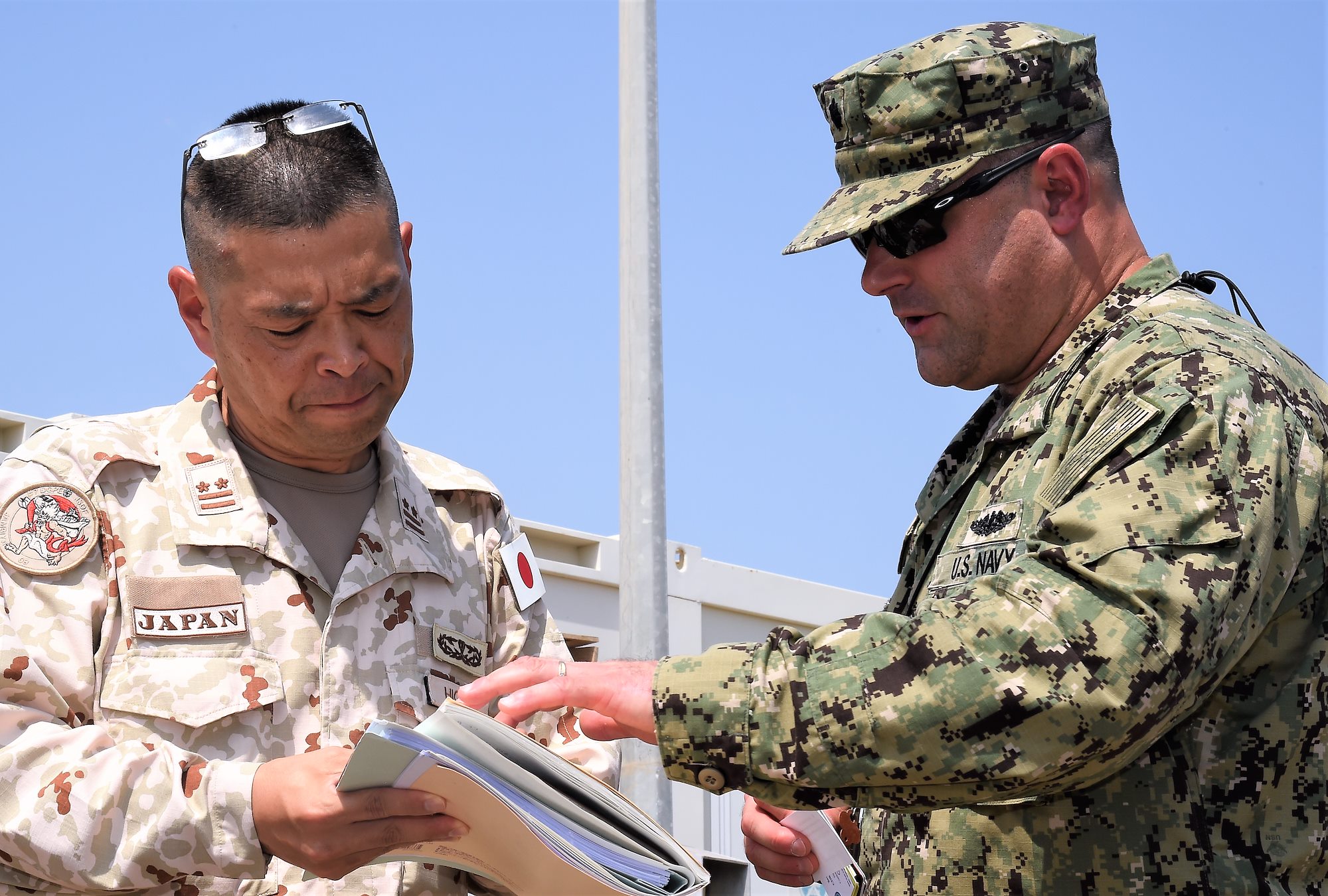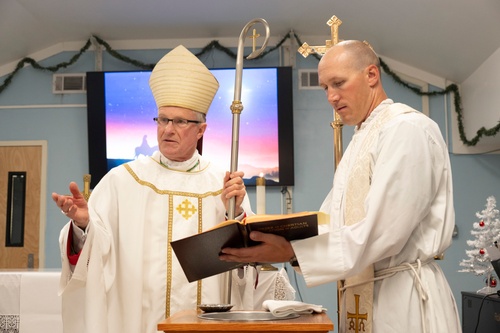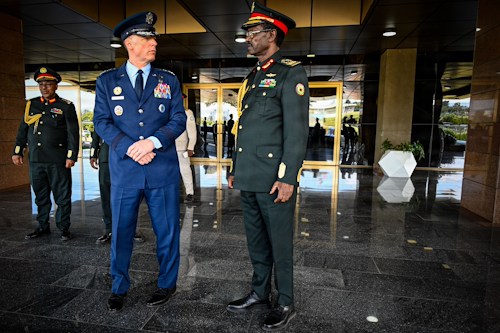Gallery contains 6 images
×
Photo 1 of 6
U.S., Japanese, French, Italian militaries partner for first multilateral NEO exercise in Africa
Combined Joint Task Force-Horn of Africa members meet with members of the Japanese military to discuss a noncombatant evacuation operation (NEO) exercise and to share best practices, Djibouti, Africa, Sept. 27, 2017. The exercise included military representation from French and Italian partner nations. (U.S. Air National Guard photo by Tech. Sgt. Andria Allmond)
Photo by: U.S. Air National Guard Tech. Sgt. Andria Allmond
Photo 2 of 6
U.S., Japanese, French, Italian militaries partner for first multilateral NEO exercise in Africa
Combined Joint Task Force-Horn of Africa hosted a noncombatant evacuation operation (NEO) exercise to share best practices with the Japanese military located in Djibouti, Africa, Sept. 27 - 19, 2017. The exercise included military representation from French and Italian partner nations. During the mulit-day event, CJTF-HOA conducted table-top exercises, a combat lifesaver course and force protection discussion along with the NEO on Camp Lemonier, Djibouti, Africa.
Photo by: U.S. Air National Guard Tech. Sgt. Andria Allmond
Photo 3 of 6
U.S., Japanese, French, Italian militaries partner for first multilateral NEO exercise in Africa
Combined Joint Task Force-Horn of Africa hosted a noncombatant evacuation operation (NEO) exercise to share best practices with the Japanese military located in Djibouti, Africa, Sept. 27 - 19, 2017. The exercise included military representation from French and Italian partner nations. During the mulit-day event, CJTF-HOA conducted table-top exercises, a combat lifesaver course and force protection discussion along with the NEO on Camp Lemonier, Djibouti, Africa.
Photo by: U.S. Air National Guard Tech. Sgt. Andria Allmond
Photo 4 of 6
U.S., Japanese, French, Italian militaries partner for first multilateral NEO exercise in Africa
Combined Joint Task Force-Horn of Africa hosted a noncombatant evacuation operation (NEO) exercise to share best practices with the Japanese military located in Djibouti, Africa, Sept. 27 - 19, 2017. The exercise included military representation from French and Italian partner nations. During the mulit-day event, CJTF-HOA conducted table-top exercises, a combat lifesaver course and force protection discussion along with the NEO on Camp Lemonier, Djibouti, Africa.
Photo by: U.S. Air National Guard Tech. Sgt. Andria Allmond
Photo 5 of 6
U.S., Japanese, French, Italian militaries partner for first multilateral NEO exercise in Africa
Combined Joint Task Force-Horn of Africa , along with members of the French and Italian militaries, conducted the first multilateral noncombatant evacuation operation exercise and training for the Japan at Camp Lemonnier, Djibouti, Africa, Sept. 29, 2017. Along with participating in the loading of a Japanese light armored vehicle into a C-130 Hercules aircraft, participatns were involved in breakout sessions that included convoy and force protection procedure; seld-aid and buddy care; capabilities and assest assessments. (U.S. Air National Guard photo by Tech. Sgt. Andria Allmond)
Photo by: U.S. Air National Guard Tech. Sgt. Andria Allmond
Photo 6 of 6
U.S., Japanese, French, Italian militaries partner for first multilateral NEO exercise in Africa
Combined Joint Task Force-Horn of Africa , along with members of the French and Italian militaries, conducted the first multilateral noncombatant evacuation operation exercise and training for the Japan at Camp Lemonnier, Djibouti, Africa, Sept. 29, 2017. Along with participating in the loading of a Japanese light armored vehicle into a C-130 Hercules aircraft, participatns were involved in breakout sessions that included convoy and force protection procedure; seld-aid and buddy care; capabilities and assest assessments. (U.S. Air National Guard photo by Tech. Sgt. Andria Allmond)
Photo by: U.S. Air National Guard Tech. Sgt. Andria Allmond
CAMP LEMMONIER, Djibouti – Initiated by the Japanese military, Combined Joint Task Force-Horn of Africa (CJTF-HOA) supported a joint-nation noncombatant evacuation operation (NEO) exercise and training here, Sept. 29.
CJTF-HOA assists partner nations in building their militaries’ capability and capacity to execute peace operations and respond to emergencies, which not only enhances security and stability throughout Africa, but is also beneficial to U.S. security interests.
“A situation occurring in a country that prompts the Japanese to conduct a NEO here will most likely also cause the U.S. and other nations to do the same,” said U.S. Navy Lt. Cmdr. Jason Lewis, CJTF-HOA exercise planner. “This means it's likely if a NEO is going to be conducted by one nation, other nations are going to want to evacuate their noncombatants for the same reasons. So, NEO operations are inherently multinational.”
A NEO is the military assisted departure of civilian noncombatants and nonessential military personnel from danger in an overseas country to a designated safe haven. Overseas evacuations could occur under a variety of circumstances, including civil unrest, military uprisings, environmental concerns, and natural disasters. Due to the predominately unpredictable nature of the aforementioned triggers, all nations can benefit from this training.
This year’s NEO exercise is an evolution from a 2016 bilateral tabletop training, an event that embodied multinational partnerships and multifaceted training opportunities.
A noteworthy addition to this year’s exercise was the hands-on segment of loading a Japanese military vehicle on a U.S. military aircraft, which also ties in to U.S. Africa Command’s objective of working with partners to protect U.S. personnel and facilities and respond to crisis by providing military assistance. Additionally, whereas last year’s event involved solely the U.S. and Japan, this year included both French and Italian representation.
“This is the first time in Africa we’ve had a multilateral exercise of this kind,” said Lt. Col. Shingo Akeno, of the Japanese military international cooperation office in Djibouti. “Africa is an unfamiliar area for most of the Japanese [military]; perhaps the United States, French and Italians have experience and we could all benefit from the sharing of that knowledge.”
Lewis reinforced Akeno’s assertion, stating that “building the relationships ahead of time, before a NEO is needed, will improve each nation’s response to an evacuation.”
Leading up to and after the NEO exercise – in which a Japanese light armored vehicle was loaded into a C-130 Hercules – the event included multiple sessions and break-out exercises. The group took part in a joint-military force protection and convoy discussion; Japanese noncommissioned officers attended a combat lifesaving course; and each nation reviewed its capabilities and operational postures.
“We’d like to know the different abilities of each nation here – that’s very important,” said Akeno. “In Djibouti, each country’s forces, capabilities and assets are restricted, so we have to compensate with the help of each other.”
Akeno stated that he’d like to see multinational trainings like this one continue to grow to include both embassy and U.S. State Department involvement.
In 2009, Japanese military first deployed to Djibouti – initially to Camp Lemonnier – to serve an antipiracy mission in the region. Four years later, they erected a military installation in close proximity to those of the U.S., France and Italy. This vicinity assists in a transnational investment of resources, which maximizes mutual objectives.
“This may seem like a small step – exchanging ideas; but it’s a big step for us,” said Akeno. “We’d like to expand on these events every year and continue to work together.”






















